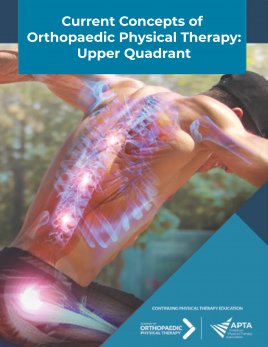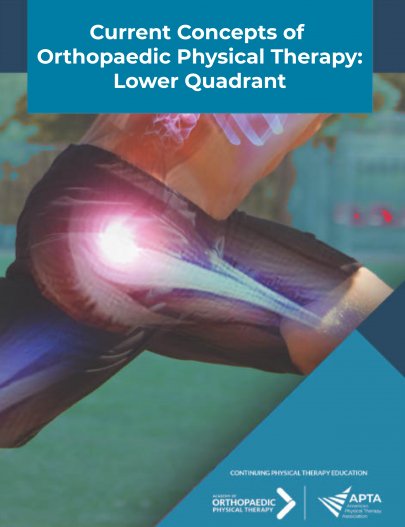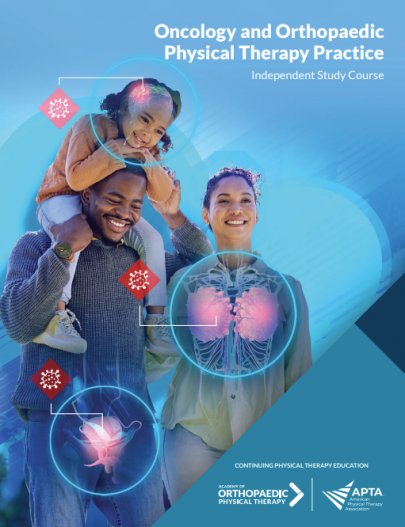
Current Concepts of Orthopaedic Physical Therapy - The Upper Quadrant
| Online Only | Online + Hard Copy | |
|---|---|---|
| APTA Orthopedics Member | $245 | $285 |
| Non-APTA Orthopedics Member | $395 | $435 |
Related Courses
Cancellation Policy / Refund Policy
Due to the automation of our learning management system allowing you instant access to the online content and the immediate order placement for a plus print product, there are no refunds after an order is placed.
Get A Sneak Peek...
Get a bird's-eye view direct from our ISC Editor and some of our authors here.
Course Description
The authors of each monograph in this 5th edition have provided a comprehensive, contemporary evidence-based review. The first monograph describes the multifaceted process of clinical reasoning and utilization of evidence in physical therapy practice. Each of the remaining monographs covers a major joint/region of the body of the upper quadrant. Each monograph starts with a review of clinically relevant anatomy and biomechanics followed by a presentation of the most evidence-based historical and physical examination procedures helpful in formulating a diagnosis, prognosis, and plan of care. This is followed by a discussion of common musculoskeletal conditions and their related optimal intervention strategies, again based on available evidence, supplemented by clinical expertise when evidence is lacking. Finally, at the end of each monograph, case scenarios are presented to invite clinical reasoning and the integration of the presented material. This collection of monographs, written by well-established expert clinicians, represents a unique and valuable source of information for physical therapists working with patients with musculoskeletal conditions.
Course Overview
Course Format: Online with an option to purchase the print version
Contact Hours: 56 contact hours
State Approval: AOPT courses are accepted in all states plus the District of Columbia, as allowed by the type of course requirements in state regulations. A small number of states require APTA to seek pre-approval of courses. The approval codes for these states can be found here. Always check with your State Licensing Board to confirm contact hours offered.
View Full State Approval InformationCourse Objectives
- Understand different types of clinical-reasoning strategies used during physical therapy management of individuals with musculoskeletal conditions.
- Conduct a thorough history/interview and perform a physical examination using evidence-based tests and measures for a variety of musculoskeletal conditions.
- Interpret the results of a musculoskeletal examination to develop an optimal plan of care.
- Detect red and yellow flags and understand their clinical implications.
- Apply research evidence to clinical decision-making related to the diagnosis, prognosis, and treatment of musculoskeletal conditions.
- Integrate knowledge of biological pain mechanisms (nociceptive, nociplastic [non-nociceptive], and neuropathic) as it relates to the physical therapy evaluation and treatment of musculoskeletal conditions.
- Understand how psychosocial factors can influence the pain experience in the context of musculoskeletal conditions.
- Discuss the importance of the therapeutic alliance and strategies to incorporate this alliance into clinical practice.
- Integrate common self-report and performance-based outcome measures as part of the assessment process.
- Discuss the relative role of diagnostic imaging and the clinical implications of positive/negative findings.
Topics and Authors
- Integration and Application of the Scientific Method, Evidence-based Practice, and Clinical Reasoning
Sean P. Riley, PT, DPT, ScD - The Cervical Spine: Evidence-Informed Physical Therapy Patient Management
Eric K. Robertson, PT, DPT, OCS, FAAOMPT; Mary K Derrick, PT, DPT, OCS, FAAOMPT - The Temporomandibular Joint: Evidence-Informed Physical Therapy Patient Management
Sally Ho, PT, DPT, MS, OCS; Kai-Yu Ho, PT, MSPT, PhD - The Thoracic Spine & Rib Cage: Evidence-Informed Physical Therapy Patient Management
Scott Burns, PT, DPT, OCS, FAAOMPT; Michael O’Hara, PT, DPT, OCS; William Egan, PT, DPT, OCS, FAAOMPT - The Shoulder: Evidence-Informed Physical Therapy Patient Management
Amee L. Seitz, PT, PhD, DPT, OCS; Heather Christain, PT, DPT, OCS, SCS; Adam Lutz, PT, DPT, PhD; Ellen Shanley, PT, PhD, OCS - The Elbow: Evidence-Informed Physical Therapy Patient Management
Mark Dutton, PT - The Wrist & Hand: Evidence-Informed Physical Therapy Patient Management
Mia Erickson, PT, EdD, CHT, ATC; Carol Waggy, PT, PhD, CHT
Customers Frequently Viewed




Add To Cart
Which version of the course would you like to purchase?
Members Only
You need to be a member to buy this course.
Join today to enjoy exclusive deals and prices on all courses.
Join Now